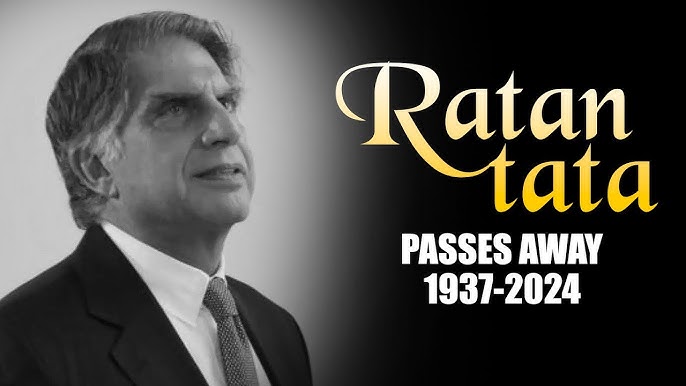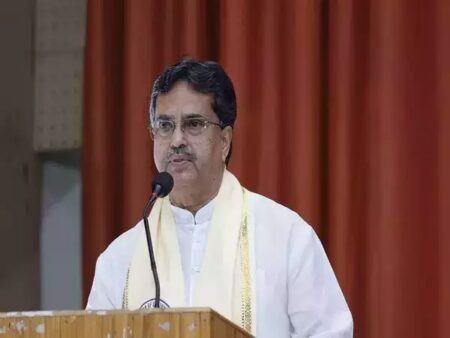Ratan Tata: A Titan Who Transformed Generations
"None can destroy iron, but its own rust can! Likewise, none can destroy a person, but their own mindset can." These profound words by Ratan Naval Tata resonate deeply with his extraordinary life and legacy. As

“None can destroy iron, but its own rust can! Likewise, none can destroy a person, but their own mindset can.”
These profound words by Ratan Naval Tata resonate deeply with his extraordinary life and legacy. As the world mourns the loss of this towering figure in Indian industry, it’s essential to reflect on the journey of a boy from Mumbai who transformed the Tata Group into a global powerhouse.
Early Life and Education
Born on December 28, 1937, to Naval and Soonoo Tata, Ratan Tata’s formative years were shaped by the values instilled by his family. Raised by his grandmother, Navajbai R Tata, in the opulent Tata Palace, young Ratan was exposed to the world of business and philanthropy from an early age. His education began at Campion School and continued at Cathedral and John Connon in Mumbai, laying the foundation for his intellectual pursuits.
In 1955, he embarked on a journey to Cornell University in the United States, where he studied architecture and engineering for seven years. This academic grounding would later serve him well in his diverse roles within the Tata Group.
The Tata Journey Begins
Ratan Tata joined the Tata Group in 1962, beginning as an assistant in Tata Industries. His early career was marked by rigorous training, first at Tata Engineering and Locomotive Company (now Tata Motors) and then at Tata Iron and Steel Company (Tisco). His commitment to learning and leadership soon became apparent as he took on various roles, including a stint as the Tata Group’s resident representative in Australia.
By 1974, he was appointed as a director on the board of Tata Sons, marking his entry into the upper echelons of the company’s leadership. This was a pivotal moment in his career, setting the stage for his eventual rise to chairman.
Chairman of the Tata Group
In March 1991, Ratan Tata took over from JRD Tata as the Chairman of Tata Sons and the Tata trusts. This marked the beginning of a transformative era for the conglomerate. Under his stewardship, the Tata Group experienced unprecedented growth, with profits multiplying fifty-fold over two decades. His vision led to a robust international presence, with acquisitions that included renowned brands like Jaguar Land Rover and Tetley.
Ratan Tata’s leadership coincided with the liberalization of the Indian economy, allowing him to strategically restructure the group. The new millennium saw a flurry of high-profile acquisitions that solidified Tata’s global standing, including the purchase of Corus and Daewoo. His launch of the Tata Nano in 2008 was a testament to his innovative spirit, aimed at making car ownership accessible to the masses.
A Man of Philanthropy
Beyond business, Ratan Tata was revered for his philanthropic endeavors. Known for disbursing a significant portion of his wealth to charitable causes, he was a proponent of investing in startups led by young entrepreneurs. The Tata Group’s unique ownership structure, with a majority held by philanthropic trusts, further showcased his commitment to social responsibility and community development.
Despite his immense success, Ratan Tata remained humble and preferred to stay out of the limelight. He was known for his shy demeanor and personal choices, including a life without marriage or children. However, his leadership was not without controversy; late in his career, he faced significant media attention over the ousting of his handpicked successor, a situation that captured public interest for years.
A Lasting Impact
Ratan Tata stepped down as Chairman of Tata Sons in December 2012, concluding a remarkable 50-year association with the Tata Group. He was appointed Chairman Emeritus, a title that reflected both his contributions and his ongoing influence within the organization.
As India’s Prime Minister Narendra Modi aptly put it, Tata was “a compassionate soul and an extraordinary human being,” whose unwavering commitment to societal betterment will be remembered long after his passing.
On October 9, 2024, the world bid farewell to Ratan Tata at the age of 86 in Mumbai’s Breach Candy Hospital, following routine medical investigations. His legacy as a business titan, global icon, and philanthropist lives on in the countless lives he touched and the enduring impact of his work.
Timeline of Ratan Tata’s Life
– 1937: Born to Soonoo and Naval Tata on December 28.
– 1955: Leaves for Cornell University, studying architecture and engineering.
– 1962: Awarded a bachelor of architecture degree; joins Tata Industries as an assistant.
– 1962: Trains for six months at Tata Engineering and Locomotive Company (Tata Motors).
– 1963: Moves to Tata Iron and Steel Company (Tisco) for a training program.
– 1965: Appointed technical officer in Tisco’s engineering division.
– 1969: Works as Tata group’s resident representative in Australia.
– 1970: Returns to India; joins Tata Consultancy Services for a brief stint.
– 1971: Becomes director-in-charge of National Radio and Electronics (Nelco).
– 1974: Joins the board of Tata Sons as a director.
– 1975: Completes Advanced Management Program at Harvard Business School.
– 1981: Appointed Chairman of Tata Industries, promoting high-technology businesses.
– 1983: Drafts the Tata strategic plan.
– 1986-1989: Serves as Chairman of Air India, the national carrier.
– March 25, 1991: Becomes Chairman of Tata Sons and Tata trusts, succeeding JRD Tata.
– 1991: Begins restructuring of the Tata Group amid Indian economic liberalization.
– 2000 onwards: Oversees growth and globalization, including major acquisitions like Tetley and Jaguar Land Rover.
– 2008: Launches the Tata Nano; awarded the Padma Vibhushan by the Government of India.
– December 2012: Steps down as Chairman of Tata Sons after 50 years, becomes Chairman Emeritus.
– October 9, 2024: Passes away at the age of 86 in Mumbai.
Medgate today extends its condolences to a great personality whose humanitarian efforts, industry leadership, and independent spirit have left an indelible mark on the nation. Ratan Tata lived his life for others, striving to bring comfort and betterment to countless lives. He is a true personality whose legacy will always be remembered, and whose presence will never fade away.
As we reflect on his remarkable life, we are reminded of his beautiful quote: “I don’t believe in taking right decisions. I take decisions and then make them right.”






